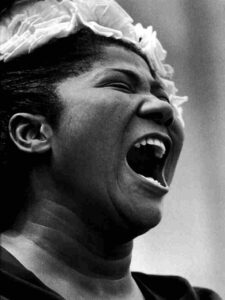
“Jazz speaks for life. The blues tell the story of life’s difficulties — and, if you think for a moment, you realize that they take the hardest realities of life and put them into music, only to come out with some new hope or sense of triumph. This is triumphant music.” – Martin Luther King, Jr
June is Black Music Month. Black music has had an indelible impact on the Civil Rights Movement and the ongoing struggle for Black liberation. Deeply rooted in African tradition, music, and Black American resistance have gone hand in hand since before our country’s founding. Black Americans have used the power of music in countless ways; inspiring and guiding enslaved people toward freedom, forging alliances among protestors, and, most recently mobilizing millions to combat police brutality.
Music is a form of storytelling. The use of music in the Civil Rights Movement served as an essential form of communication and community building. Singers and musicians collaborated with Civil Rights leaders to share songs with activists and the community. These songs motivated them through long marches, to push through harassment and brutality, and to cope with the stress and loss of loved ones.
In the rich tapestry of historical melodies, one anthem stands resolute: “We Shall Overcome.” Born from the depths of the 19th-century African American Gospel, it found its voice amidst the early throes of the Civil Rights movement. Joan Baez’s rendition at the 1963 March on Washington, alongside President Lyndon Johnson’s invocation of its lyrics in advocating for the Voting Rights Act of 1965, cemented its status as an emblem of the struggle.
Yet, it was not alone in its resonance. Nina Simone’s “Mississippi Goddam” encapsulated the anguish of Medgar Evers’ murder and the 16th Street Baptist Church bombing in Birmingham, Alabama. Her repertoire, including “Four Women” and “To Be Young, Gifted and Black,” underscored the movement’s tumultuous narrative.
Preceding this era, Billie Holiday’s “Strange Fruit” painted a chilling tableau of racial terror, evoking the haunting specter of lynching. For Holiday, it was a deeply personal lament, tethered to the memory of her father’s tragic death due to racial prejudice.
The Civil Rights Movement, marked by both elation and trepidation, found solace in music’s embrace. As they confronted violence and oppression, protesters found strength in song. From the fields of southern plantations to the pulsating rhythms of rock & roll, these melodies served as a beacon of unity and resilience.
Dr. King’s assertion that “songs were the soul” of the movement rings true. Whether sung amidst marches or within the confines of jail cells, these anthems provided solace, courage, and a sense of collective purpose.
Across generations, the legacy of these songs endures. They serve as a testament to the enduring power of music in the pursuit of justice and equality, reminding us that the struggle for freedom knows no bounds. The power of these timeless songs will undoubtedly continue to live on to inspire future generations.
- Music –the Soul of the Movement Past, Present and Future - June 11, 2024
- Black History Month - February 9, 2024
- Voting is King - January 15, 2024
Empower People To Power Our Planet
April 23, 2025
“If every day were Earth Day, we wouldn’t be in the mess we’re in.”— Neil deGrasse Tyson Earth Day 2025 is April 22nd, and it raises…
April is Genocide Awareness Month—a time of remembrance, reflection, and responsibility.
April 15, 2025
This month was chosen because several of history’s most devastating genocides began or are commemorated in April, including the Armenian…